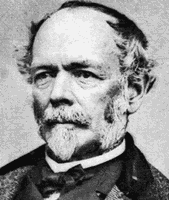
|
|
VITAL STATISTICS
|
BORN: 1807 in Farmsville,VA.
DIED: 1891 in District of Columbia.
CAMPAIGNS: Harper's Ferry, First Bull Run, Peninsula,
Yorktown, Williamsburg, Seven Pines, Atlanta, Carolinas.
HIGHEST RANK ACHIEVED: General.
|
|
BIOGRAPHY
|
| Joseph Eggleston Johnston was born on February 3, 1807, on Farmville, Virginia. Graduating from West Point in 1825, he spent 8 years fighting against Native Americans and serving on frontier duty. Resigning to become a civil engineer, he took part in John Wesley Powell's geological expedition to Florida, which was attacked by Indians in 1838. His use of military skills during this attack, in spite of being wounded, earned him a recommission as 1st lieutenant in the Topographical Engineers. On June 28, 1860, he became quartermaster general and brigadier general. In April of 1861, he resigned from the US Army, shortly before Virginia seceded from the Union. Appointed major general of Virginia troops, he was soon commissioned brigadier general in the Confederate army. Assigned to Harpers Ferry, he and his troops managed to slip away from an engagement with a superior Union force, and reinforce Confederate Brig. Gen. P. G. T. Beauregard's troops at the First Battle of Bull Run. His success in that battle led to his promotion to full general on August 31, 1861, to rank from July 4, 1861. Johnston was not happy with the situation, since he was placed fourth among the Confederacy's full generals (Samuel Cooper, Albert Sidney Johnston and Robert E. Lee had greater seniority.), and did not retain the seniority he had enjoyed in the US Army. Johnston fought to defend the Virginia peninsula during the McClellan's Peninsula Campaign, covered his troops' withdrawal at Williamsburg. He was wounded twice in battle at Seven Pines, and took several months' leave to recover. When he returned to duty, he was assigned to the command of the Department of the West. He was ordered to stop Ulysses S. Grant, but received commands from Confederate President Jefferson Davis which were unclear and at times contradictory. This, and the lack of troops, contributed to the eventual Confederate surrender of the garrison on July 4, 1863. In December of that year, after Confederate Maj. Gen. Braxton Bragg's difficulties at Chattanooga, Johnston was placed in command of the Army of the Tennessee, with orders to reorganize the army and turn it into an offensive force. He reorganized it successfully, but was cautious in taking the offensive. Johnston preferred to allow his opponents to fight on the offensive and expend their strength, after which he would be able to counterattack his now-weakened enemy. Confederate President Davis did not appreciate Johnston's strategy, especially during the Atlanta Campaign. Davis eventually relieved Johnston of command on July 17, 1864. His replacement, Lt. Gen. John B. Hood, also a cautious officer, failed to hold Atlanta. After Hood's difficulties in the Franklin and Nashville Campaign, Gen. Robert E. Lee placed Johnston back in command. Johnston led the Army of the Tennessee through the Carolinas Campaign . After General Lee surrendered, Davis ordered Johnston to continue the war. Johnston, who recognized that further efforts would be hopeless, signed the final surrender terms on April 26, 1865, ending his military career. After the end of the Civil War, Johnston worked in insurance and lived in different southern cities. He wrote memoirs, entitled "Narrative of Military Operations Directed During the Late War Between the States" (1874); and was elected to the US House of Representatives in 1878, serving from 1879 to 1881. From 1885 to 1891, during President Grover Cleveland's administration, he worked as commissioner of railroads. Johnston died on March 21, 1891, in the District of Columbia. |
|